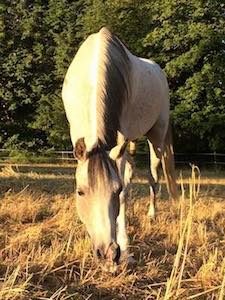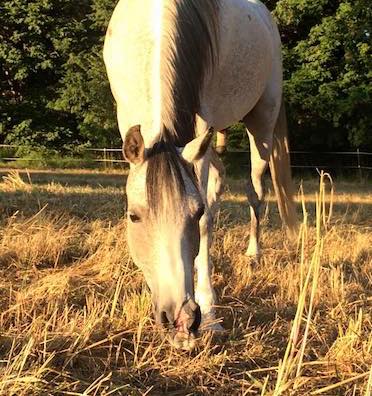Brightly Colored Plants Healthy for Horses and Humans
by Dr. Eleanor Kellon

Green drinks are a hot human health craze these days and with good reason. But did you know brightly colored foods are as healthy for your horse as they are for you?
Plant polyphenols are natural compounds with strong antioxidant capacity, with plant pigments having a variety of benefits for the immune system. Green pigment (chlorophyll) is only one piece of the picture. Flavonoids, carotenes, lycopene, zeaxanthin, anthocyanins, and betalains are also plant pigments that provide amazing benefits for immune function.
Antioxidant phenolic compounds are widely distributed through nature in herbs. They are some of the most potent antioxidants ever found, and penetrate into body tissues easily. It has also been confirmed that combinations of different plant phenolics and bioflavonoids work together to produce a greater effect, meaning that lower dosages can be used.
Immunity is an amazing and complicated function. It is divided broadly into two reactions that shoot first, and ask questions later. The innate immune system responds immediately to any foreign substance or organism. The sophisticated immune system targets specific invaders with antibodies and remembers them in stored cells.
Healthy inflammation is a built-in immune response to invading organisms or toxins, as well as the method of removing dead or injured tissues. The immune system also has an intricate set of checks and balances that protects the body’s own tissues from direct attack as well as from collateral damage from friendly fire.
Many plant flavonoids also work with the body’s defense systems in fortifying defense systems against the invasion of cells by harmful organisms.
- Chlorophyllin, a derivative of chlorophyll, supports the natural healing of open wounds and its consumption is associated with higher numbers of all immune system cells. Chlorophyll and chlorophyllin are also natural antioxidants, as are all plant pigments.
- Bioflavonoids are a diverse class of plant chemicals with well documented antioxidant effects and include hesperidin, quercitrin, rutin and tangeritin, which can help preserve vitamin C levels in the tissues. Some citrus bioflavonoids can also stabilize capillary walls, help prevent swelling at areas of allergic reaction, and help maintain normal, healthy levels of inflammation.
- The skin and seeds of grapes are rich in polyphenol, with the most well-known being resveratrol. Grape polyphenols also have directly support a population of T cells that contribute to targeted immune responses. They also have the capacity to balance inflammatory reactions.
- The pigments of the blue-green algae spirulina work with the horse’s body in the same way, and also helps stabilize the mast cells that release histamine.
Vitamins are also known to be supportive of healthy immune function.
- Vitamin C is an important antioxidant in the immune system that protects the interior of the cells. It has been clearly shown that vitamin C levels in lung fluid from horses with chronic lung disease are low.
- Vitamins A and E are fat soluble antioxidant vitamins which work protecting the cell membrane from attack. Vitamin A, from beta-carotene, is particularly important for skin.
- The B vitamins support active division of immune system cells and some have specific immune system functions. Riboflavin is involved with both the destruction of organisms by immune cells and in cellular immunity. Thiamine is also essential to normal functioning of T cells in the cellular immune system. Folic acid deficiency has been clearly linked to increased infection risk.
Uckele Health & Nutrition offers products that are rich in antioxidants for healthy immune function.
Bio-Quench supports horses with seasonal allergies. With potent antioxidants including glutathione and Super Oxide Dismutase, bioflavonoids, and herbs. With natural antioxidants to help promote the immune system and provide protection from damaging free radicals.
Phyto-Quench provides powerful antioxidants to help maintain healthy immunity, especially for horses not on fresh pasture. Plant-based phytonutrients include garlic, turmeric, grape seed, ginkgo biloba, and Boswellia.
Lung EQ is for horses with respiratory reactions to environmental irritants and seasonal allergens. With spirulina platensis to helps stabilize the mast cells that release histamine. MSM supports normal inflammatory regulation. Flaxseed meal promotes balanced inflammatory pathways. Jiaogulan supports healthy histamine levels, airways, and immune response.
Herbal Mune Plus provides herbs and nutrients astragulus, Pau D’Arco, Siberian ginseng, echinacea, L-lysine, and turmeric to promote strong immune function.
Dr. Eleanor Kellon, staff veterinary specialist for Uckele Health & Nutrition, is an established authority in the field of equine nutrition for over 30 years, and a founding member and leader of the Equine Cushings and Insulin Resistance (ECIR) group (www.ecirhorse.org), whose mission is to improve the welfare of horses with metabolic disorders via integration of research and real-life clinical experience. Prevention of laminitis is the ultimate goal. Uckele Health & Nutrition (www.uckele.com) is an innovation-driven health company committed to being on the leading edge of nutritional science and technology for over 50 years.
Originally Published August 2017 Issue

The Northwest Horse Source is an independently owned and operated print and online magazine for horse owners and enthusiasts of all breeds and disciplines in the Pacific Northwest. Our contemporary editorial columns are predominantly written by experts in the region, covering the care, training, keeping and enjoyment of horses, with an eye to the specific concerns in our region.






